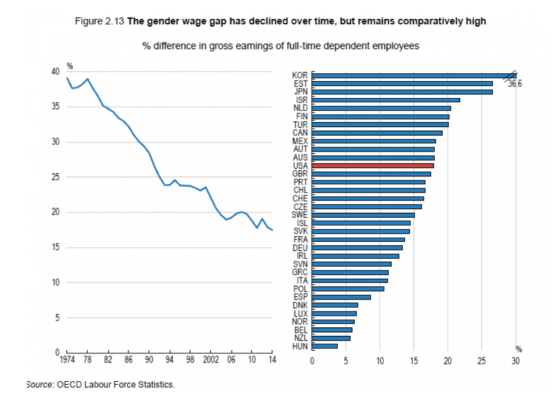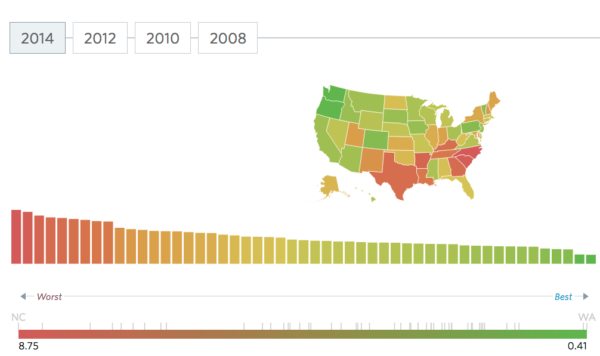Pew: This may be the last presidential election dominated by Boomers and prior generations
In a new report, Pew Research Center’s Richard Fry writes that “For the past few decades, presidential elections have been dominated by voters of the Baby Boom and previous generations, who are estimated to have cast a majority of the votes. But their election reign may end this November.”
Fry goes on to explore the demographic shifts that would make this true: “As of July, an estimated 126 million Millennial and Gen X adults were eligible to vote (56% of eligible voters), compared with only 98 million Boomers and other adults from prior generations, or 44%” of eligible voters.
What’s the problem? In one word: turnout. “We won’t know until after November if Boomers and their elders will pass the torch to Gen X and Millennials as a share of voters, but all the available data suggest that the 2016 election will mark the beginning of a new era for U.S. presidential elections.”
EPI: "Women's work" and the gender pay gap
The Economic Policy Institute took an in-depth look at the pay gap, and the factors that cause it. Finding that “Women are paid 79 cents for every dollar paid to men—despite the fact that over the last several decades millions more women have joined the workforce and made huge gains in their educational attainment,” the authors conclude that:
“The gender wage gap is real—and hurts women across the board. Too often it is assumed that this gap is not evidence of discrimination, but is instead a statistical artifact of failing to adjust for factors that could drive earnings differences between men and women. However, these factors—particularly occupational differences between women and men—are themselves affected by gender bias. Serious attempts to understand the gender wage gap should not include shifting the blame to women for not earning more. Rather, these attempts should examine where our economy provides unequal opportunities for women at every point of their education, training, and career choices.”
Pew Elections Performance Index: Voting Wait Time
The Pew Trusts’ Election Initiatives Project tracks a number of data points that provide insight into each state’s voting landscape: among these are turnout, voter registration, and the availability of online registration. One of the most telling indicators of a state’s success in managing elections is Voting Wait Time.
Although long waits can indicate excitement surrounding an election, significant variation in polling place lines across precincts and communities may mean that inefficient administration is making voting more difficult for some voters. Average wait time is one measure of the ease of voting: The less time a voter waits to cast a ballot, the more convenient the experience.
How does your state measure up? Find out at PewTrusts.org.
New Survey Shows Strong Support for Paid Family Leave Fund
Paid family leave, paid sick leave, and affordable childcare: these aren’t political talking points, they’re the sort of public policies that will allow working families – including Unmarried Women and the Rising American Electorate – to succeed in today’s economy. A new poll commissioned by the Work Family Strategy Council shows that these policies enjoy overwhelming support with American voters: “By a nearly 2-1 margin, 61 percent of voters in these states, which include Iowa, support the creation of a national paid family and medical leave fund, 69 percent support a paid sick days law, and 57 percent support increasing access to high-quality, affordable child care, according to the survey. Among Iowans polled, 63 percent said they support a national paid family and medical leave fund, while 25 percent said they oppose it.”
Other critical takeaways from the poll include:
- “Overall, a majority of voters in the 15 states believe a national paid family and medical leave fund would make the country better off, while only 26 percent think it would make the country worse off.”
- “Voters across states say they favor a law that would create a national paid family and medical leave fund: 61 percent say they favor such a law, 44 percent say they strongly favor one, while 34 percent are opposed.”
- “A strong majority of people surveyed say they face challenges when managing job, family and personal responsibilities: 63 percent of full-time workers and 67 percent of part-time workers say they would be likely to face significant economic hardship if they had to take time from their jobs without pay to care for a new child, care for a seriously ill loved one or deal with their own serious health issue.”
Read the full article at Business Record.com
Wonkblog: How Sexism Holds Back the Economy
A new Organization for Economic Cooperation and Development (OECD) report “finds a correlation between states that mandate more family-friendly policy and higher rates of women working in those states.”
“Such policies, said Angel Gurria, the OECD’s secretary-general, in an interview, signal to women that “They can have babies and bosses at the same time, or be bosses themselves, rather than choose one.”
While the pay gap in America has fallen over the past few decades, Gurria warns that it is “still massive.” The report “suggests a basket of policy changes to encourage more women and African-Americans to work, and to help those groups obtain more skills and better jobs. They include “family-friendly” policies, such as mandated paid parental leave and expanded public access to day care and pre-school, that help women who might otherwise drop out of the labor force to raise their children and struggle to return to a similarly paid job in the future.”

Read the full story at Washington Post’s Wonkblog.
CNN / Pew Research: Millennial Voters Rise Up
As seen in CNN, Pew Research Center’s latest report confirms Millennials have overtaken Baby Boomers – but in terms of voter registration, Boomers still dwarf Millennials.
Both Millennials and Baby Boomers account for about 31% of Americans who can vote, though the number of Baby Boomers, who are ages 52 to 70 this year, has been declining since its 2004 peak of 72.9 million. Gen Xers, who are between 36 and 51 years old, number only 57 million, or 25% of the electorate. […]
“While it might be a ‘slam-dunk’ that millennials soon will be the largest generation in the electorate, it will likely be a much longer time before they are the largest bloc of voters,” wrote Pew Senior Researcher Richard Fry, who authored the report.
Virginia Web Tools Let Users Access Interactive Election Data
Pew Charitable Trust and the Virginia Department of Elections teamed up to help make “decisions related to election administration more transparent and evidence-based.”
Their early results are in, and they are encouraging..
James Alcorn, chairman of the State Board of Elections, thinks this project will be an important resource for election officials and the public. “All too often, discussions about election administration turn on anecdotes because objective evidence wasn’t easily available. This tool turns the hard data that the Department of Elections collects into accessible, objective information that can be used to improve elections across the commonwealth,” he says.
We at VPC are particularly impressed with Virginia’s interactive tool for examining voter registration trends. Check it out for yourself, or read the full story at Pew.
Pew: Millennials overtake Baby Boomers as America’s largest generation
Pew Research Center reviewed the U.S. Census Bureau’s latest population estimates, and confirmed that the Rising American Electorate has risen all the way to the top. As of April 2016, “Millennials, whom we define as those ages 18-34 in 2015, now number 75.4 million, surpassing the 74.9 million Baby Boomers (ages 51-69). And Generation X (ages 35-50 in 2015) is projected to pass the Boomers in population by 2028.”
Read the full story.
CAP: Oregon’s Success Shows Way Forward for Automatic Voter Registration
As a recent editorial in the New York Times highlights, while some states are taking advantage of the Shelby decision to prevent Americans from voting, several states are working to expand the franchise and protect citizens’ voting rights.
Oregon, in particular, is blazing the path forward with its adoption of automatic voter registration at the DMV. Liz Kennedy at Center for American Progress writes: “The millions of eligible citizens who are missing from America’s voter rolls can be placed on those rolls in a cost-effective and secure manner. States can and must remove barriers and facilitate political participation for all eligible voters so that every voice is heard as our nation charts the course forward together.”
Read the full story.
The Atlantic: Will Single Women Transform America?
In her book All the Single Ladies, Rebecca Traister takes a long look at the history of marriage in the United States.
“The unprecedented rise in independent, unmarried women demands shifts in power dynamics and policy.”
See the video.


